As the Sarawak state election approaches, June Rubis asks: Why are rural Sarawakians so loyal to the ruling party? Should they expect more from their elected reps?

- Let’s not lose our heads over this upcoming election | Credit: June Rubis
For the past several months since I returned from Kalimantan, Indonesia, I’ve had the opportunity to follow the good people of the Sarawak Dayak Iban Association (SADIA) on the ground, to learn more about the rural indigenous peoples issues in Sarawak. I came with the intent to learn, which meant putting everything I knew on the back-burner, and starting anew. It has been an eye-opener in many ways.
As a wildlife conservationist, it has been a struggle internally to accept ideas from the indigenous civil society that may not always be aligned with principles of conservation that I hold dear. For example, taking over a disputed plot of native land and planting oil palm because the community needs income to sustain themselves, and pay for legal fees, for the long battle awaiting for them in court.
It may come to a surprise to many that in Sarawak, the rural population have more or less accepted oil palm plantations as a reality — the fight for some of these communities is often about getting rightful compensation (see for example, the case of Rumah Ranggong). Sometimes the fight is also for the right to develop native lands for cash crops such as rubber, durian, pepper, etc., for land to be set aside for shifting cultivation, and for land to be kept as ‘pulau‘ for the forests to regenerate, and to secure watersheds.
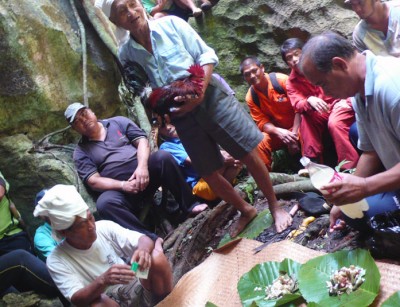
Most recently, I had the opportunity to take part in a very special miring ceremony held by several Iban villages in the Simunjan District of Sarawak. The miring ceremony took place in a mysterious cave where villagers believed their ancestors once lived: a longhouse cursed into stone, along with all of its inhabitants.
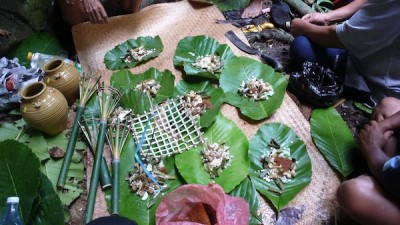
The villagers felt the need to call out to their ancestors for help — they are currently in dispute with an oil palm plantation that has taken over their ancestral lands. About 70 people from at least three different villages cramped into the small cave, where a chicken and a pig were decapitated to appease the spirits.
Four elders officiated the ceremony, and one elder called out to the spirits of the cave to protect the descendants, to support their fight to keep their lands, and to prevent intruders from passing through their lands without permission.
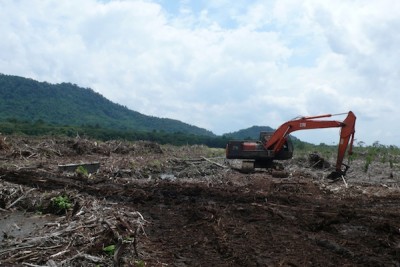
We later walked through the disputed land in question, already cleared and planted with oil palm trees. Our guide Sebi from Kampung Ruan Surek talked about the villagers’ plans to secure their territory: some of them have decided to open up their lands to plant oil palm, and have planned to build huts so that they could keep a watchful eye on their crops.
The only settlement built on the land so far are occupied by Indonesian workers and their families, as they work on the oil palm plantation. The land that they were working on is hot and barren. These workers completely depend on the cash from this employment for daily subsistence.
Rural Sarawakians face the danger of losing of the ability to feed themselves through cash crops planted on their lands, and to fish in unsoiled rivers. We speak of bringing these communities into ‘development’ yet we forget that what rural communities ask for is the right to self-determine their own development.
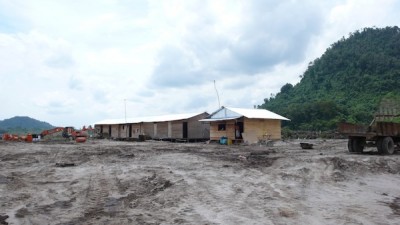
Upon returning to the village, we sat down and talked to some of the women. I wanted to know what their thoughts are about the land dispute and the upcoming state election. What I found out was not surprising: despite the dispute with the oil palm company, despite their frustration regarding their lands being taken away, they are still loyal to the ruling party of Sarawak, that is, Barisan Nasional.
It is indeed confusing to many Malaysians why rural Sarawakians feel beholden toward Barisan Nasional. There is a huge disconnect between the role of their elected ADUN and the daily struggles they face. The expectations that most rural communities have of their elected reps are very modest and far from the actual responsibilities these representatives should provide as a service to their communities. In fact, the communities often feel indebted towards their elected representative, and not the other way around.
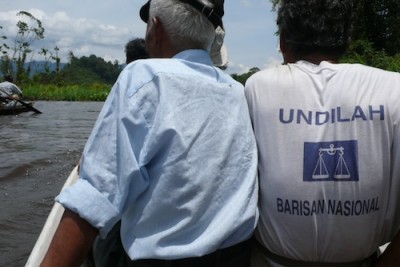
Several villagers thought I had come to represent their local state assemblyman, YB Haji Mohd. Naroden. A woman asked for funds to help take care of her grandmother. We gave her information on how to seek for assistance from the Welfare Department. She was disappointed when she realized that we were not going to give her money out of our own pockets.
The system of patronage still holds strong in Sarawak, where a couple of hundred ringgit can easily buy a vote. It’s maddening but it is real. Malaysians still have a tendency to look for a hero — whether in politics or in civil society. To me, it is a sign of not wanting to take personal responsibility for the change we desperately seek. It is easy to laud the actions of someone, put them on a pedestal and absolve ourselves of actually doing something — other than complaining of course.
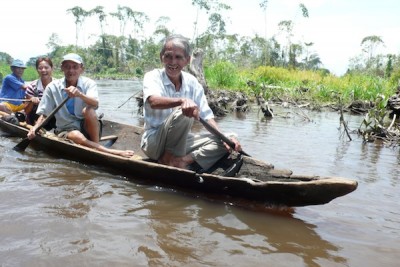
Over the months of working with SADIA, coupled with my own journey with LoyarBurok, I’ve realized that the greatest asset for change is personal knowledge: knowledge of what our rights are as a Malaysian citizen, knowledge of the electoral process, and knowledge of the role of our elected representatives. With knowledge comes taking absolute responsibility for our own life, not just viewing ourselves as victims of an unjust political process. In light of the upcoming state elections, this means going beyond vote registration and into voter education. Of course, with a few weeks left before polling, Sarawak has probably missed the boat on this.
But it doesn’t mean that we should not start — it can start now. On a personal level, it can mean:
1. Placing a vote even if you think your political party of choice would win anyway,
2. Reading up on our constitution, the functions of our state legislative assembly,
3. Getting involved in voter education campaigns such as UndiMalaysia.
We may not see the change we want in this election. But we can ensure that whomever is elected is beholden to the promises that they have made and the responsibilities entrusted to them. We will find our voice and use it as much as we can.
And maybe one day, even while we still honour the gods, we won’t have to depend on them to save us, for we will have the tools to save ourselves.
June Rubis is orang asal Sarawak, born & bred, and has previously written for the Malaysian Insider on the Sarawak reaction after the 2008 tsunami. She has recently returned from Kalimantan, after a stint in orang utan conservation work. She may or may not have written about orang utans and spooky jungle nights for LoyarBurok.

wow….lets be sure we will be more appreciated in future…vote d damn BN out…people power!!!!
June, offer yourself to the DAP opposition as candidate, then tell the folks frankly their predicaments . More effectively, I guessed so.
Wonderful article, June. I don't understand how the power that be can keep so many rural Sarawakians in the dark and make them satisfied is amazing! Hope this changes soon.
Good that Sarawakians like June will share her thoughts/reflection on going on in Sarawak. The claim that rural Sarawakians are `loyal' to BN is questionable, where the reps are elected from a small pool of the rural populations, at no more than 30%! Over half of the eligible rural folks are not registered as voters, and only 58-63% of those registered went to vote in last 2 elections. That said the lack of voter education, rightly identified by June, cause those voting to vote according to the little cash/goodies thrown to them. Malaysians who underatnd this appalling situation should feel ashamed that our democracy is currently held hostage by such unfree elections in Sarawak!
Paradoxically it is because West Malaysians who think they know better who are not selfish enough to help Sarawakians, so as to serve their bigger interests of securing democracy for themselves! Who has the monopoly on ignorance?
Yup, agree Joe. The feudalistic system is such.
You have to look it from their point of view. East Malaysians in general have always been scared into voting into the ruling parties with the thought of the devil we know is better than the devil we don't , ie: West Malaysians/Opposition Parties
I think June also hits the nail on the head in her previous article on malaysianinsider that the older generation (read: leaders in the community) fear that they would lose their positions of power and development funds if they vote the opposition.
In such community based areas, they vote as a community -whatever the headman/leader says and not what they think. Just as in West Malaysia – They try and influence the imans who will have some clout among the communities.
Think it's tough for them. When you've always lived under the radar with just the most basic amenities and provisions, even 50 ringgit is a big deal. They are more worried about the immediate, never thinking too far into the future; maybe they are afraid to think too far into the future.
i dont understand their kind of loyalty, too.